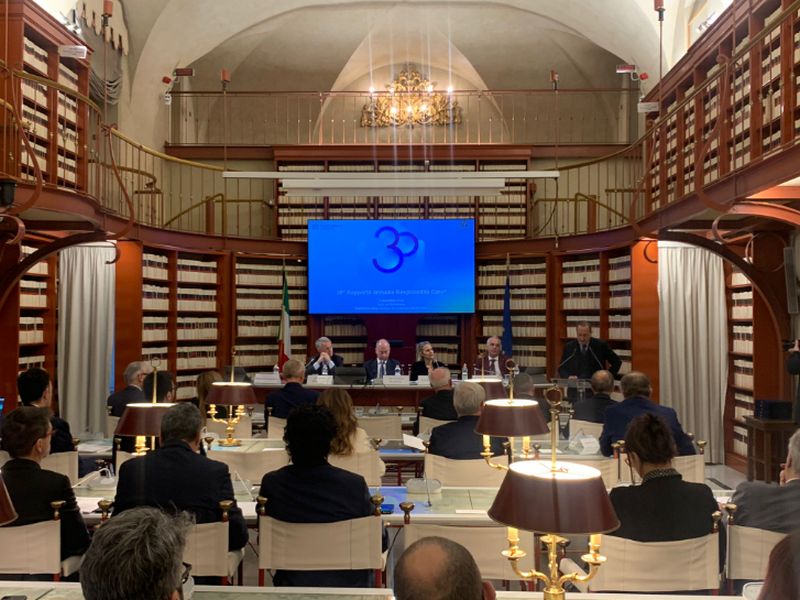ROME (ITALPRESS) – Economic value generated for 67.4 billion euros, -50.3% of energy consumption compared to 1990, 112,700 employees, -70% of occupational diseases for millions of hours worked compared to 2010. These are some of the figures that emerge from the Responsible Care Report, a voluntary global program to promote sustainable development in the chemical industry, presented this morning by Federchimica in the presence of, among others, the president of the Chamber, Lorenzo Fontana, who called the chemical sector “strategic” for the country and recalled that “if in the world there is a country with the innate ability to combine industrial tradition, talent and technological innovation, this is precisely Italy. And we must always be aware and proud of it.” Francesco Buzzella, President of Federchimica, recalled that “for 30 years with the Responsible Care Report we have been certifying the commitment of chemical companies to sustainable development: a value that we transfer to the very many downstream sectors and directly into consumer products through process and product innovations and new technologies, with results of absolute excellence; it is time that this primacy be recognized, accrediting us as an indispensable Industry to achieve the ecological transition. It is clear from the data that safety, health and a high level of well-being and healthiness in the workplace are distinctive features of the chemical sector. An achievement that is also due to the commitment of the Sectoral Social Partners in promoting social responsibility and contractual welfare, which has contributed to the creation of a modern, flexible and inclusive labor relationship, aimed at providing answers to the needs of workers and their families,” he added. In 2023, the chemical industry generated a production value of 67.4 billion euros. Of this, 91.4 percent (61.6 billion euros) is distributed to stakeholders in the form of purchases of goods and services, personnel expenses, and taxes paid to the public administration. The chemical industry contributes to the public budget and the provision of services to citizens by paying taxes of 0.9 billion euros, to which is added nearly 1 billion euros in taxes and social security charges related to personnel expenses. Investments and operating costs allocated to social and environmental sustainability by Responsible Care member companies annually account for more than 2 percent of the economic value generated, totaling €763 million, including €274 million in investments. The sector has for years boasted a leadership position in occupational safety and health: the incidence of accidents in the sector is 39 percent lower than the manufacturing average. Since 2010, the number of injuries, with the same number of hours worked, has decreased by 44 percent and shows a further 10 percent decline over 2019, partly due to raising employee awareness of safe and responsible attitudes: over the past 13 years, the number of training hours per employee has increased by 23 percent. Innovation introduced through digital technologies has also generated positive effects. On the environmental front, the report’s results are confirmed as excellent particularly in the reduction of greenhouse gases: in 2022 the chemical industry in Italy directly emitted 11.6 million tons of CO2 equivalent (scope 1), 2.8 percent of the country’s total (in 1990 they represented 6.2 percent). Since 1990, chemical emissions have decreased by 64 percent, a value that puts the chemical industry already in line with the ambitious European Green Deal target to 2030 (-55 percent). Considering emissions-direct and indirect (scope 1 and scope 2)-over the past 30 years, the chemical industry has reduced its climate change impacts by 67 percent. The chemical industry is committed to pursuing an increasingly circular economic model: recycling (45.5%) is the first mode of waste destination, up significantly from 2015 (it was 23%). The Report summarizes a virtuous process that certifies an onerous commitment on the part of companies in the sector and should be recognized, even in light of future challenges. “The goals of the Green Deal, contextualized in the international geopolitical scenario, push us to consider the issue of the competitiveness of the European economic system and to find, at the same time, global solutions to the challenges of the energy, climate and ecological transition,” Buzzella explained. This is a far from trivial task, as also recently emerged from the work of COP 29, which requires a scientific, pragmatic and non-ideological approach; an environment conducive to research, development and innovation; the ability to attract capital, investment and human resources of excellence; a clear, certain and streamlined legislative framework; and an efficient public administration. “Chemistry is indispensable for progress compatible with new environmental and social challenges. However, it needs the support of everyone, first and foremost the government and institutions, which must be at our side in this journey. “It is certainly essential to pursue the ecological transition,” Buzzella concluded, “but we need to carefully consider the relationship between benefits and costs, the time needed for adaptation and the safeguarding of the competitiveness of European companies, which, in the final analysis, is equivalent to protecting our well-being and our aspiration for progress. Filippo Servalli, president Responsible Care Program, Federchimica recalled how this “path that has lasted 30 years is a flagship of the experience of Italian chemistry, it tells of how on the issues of environment, people, safety and governance chemistry is attentive and responsible. The sector of the call is presented in a strong way and on which Italy must focus because we are competent and we have worked to be efficient, give a profitability and distributing an added value to our stakeholders because chemistry lives of supply chain that must be preserved,” he concluded.-photo xb1 Italpress -(ITALPRESS)

